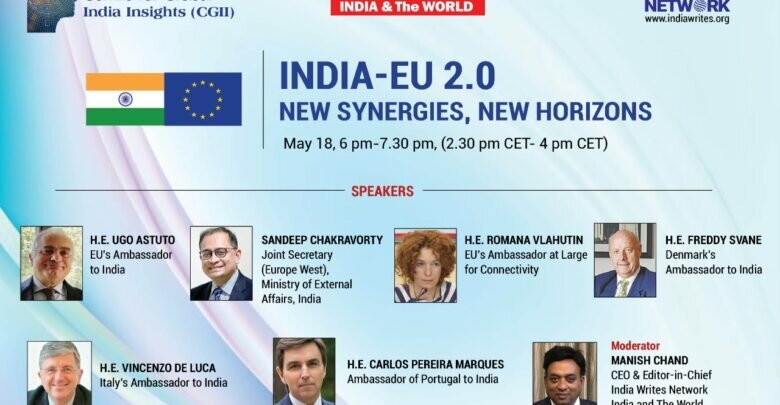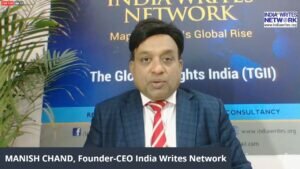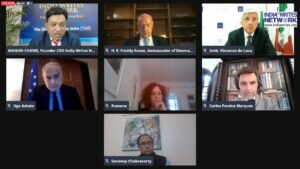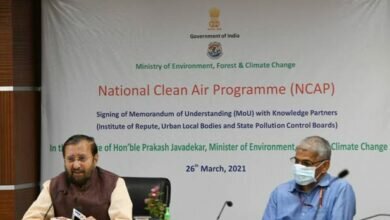EU Ambassadors upbeat about early FTA with India, back inclusive Indo-Pacific

By SHRI RAM SHAW
New Delhi, 19 May: Days after the landmark India-EU summit, ambassadors of the EU and some European countries have expressed optimism about an early start of FTA negotiations and backed enhanced collaboration with New Delhi in the Indo-Pacific, with an eye on constraining China.

Speaking at a webinar organised by India Writes Network and India and The World magazine, EU’s Ambassador to India Ugo Astuto underlined that one of the most significant outcomes of the May 8 India-EU summit was the joint decision to resume negotiations for a mutually beneficial Free Trade Agreement as well as to start negotiations on a standalone investment agreement. The envoy also spoke about early negotiations for an agreement on geographical indications, part of the three economic-related pacts which were signed at the first-ever India-EU summit held in 27+1 format on May 8.
“The European Union is one of the largest trade and investment partners of India. At the meeting, we agreed on a broad and comprehensive economic agenda so that we can fully unleash the potential of this economic partnership,” he said. “At the same time, we want to work together with India in international fora in order to shape the global agenda such as WTO reform, and work together within the G20 framework.”

The webinar, entitled “India-EU 2.0: New Synergies, New Horizons,” featured eminent speakers including the EU ambassador, Italy’s Ambassador to India Vincenzo de Luca, Portuguese Ambassador to India Carlos Pereira Marques and Denmark’s Ambassador to India Freddy Svane. Sandeep Chakravorty, Joint Secretary (Europe West) in India’s Ministry of External Affairs and Romana Vlahutin, EU’s Ambassador for Connectivity also spoke at the online conference, which was moderated by Manish Chand, CEO, India Writes Network.
“The first 27+1 summit has raised the bar and set new benchmarks for the India-EU economic strategic and economic partnership. The real challenge lies in time-bound implementation of key outcomes as this can alone can fructify benefits of India-EU partnership for 1.8 bilion people living in the two regions,” said Chand, also President, Centre for Global India Insights (CGII), a think tank focused on global affairs.
On possibilities of early start of FTA negotiations, India also struck an upbeat note. “The challenge will be to keep up the momentum to start the negotiations by preparing a scoping paper and resolving complex issues as soon as possible. If negotiators don’t do it successfully, they will be belying the faith the leaders have reposed in them,” said Sandeep Chakravorty. “We hope to resolve all issues as soon as possible. These are very demanding and complex negotiations,” said the Portuguese Ambassador.
Underlining the pivotal role of Portugal, which currently holds the rotating presidency of the EU, in mobilising consensus on FTA, the Portuguese ambassador spoke of a lot of “diplomatic work behind the scenes,” which included telephonic conversations between the prime ministers of India and Portugal and meetings between foreign ministers of the two countries. “There was a great effort from both sides. Given the Portuguese presidency of the EU, we tried to help as much as possible,” he said.
The wide-ranging discussion at the webinar also included pointed discussions on enhanced India-EU cooperation in connectivity in the Indo-Pacific.
Looking ahead, the India-EU connectivity partnership, which was announced at the summit, will acquire greater momentum, said EU’s Ambassador for Connectivity Romana Vlahutin.
Elaborating India-EU plans for collaborating in building next-generation infrastructure, Ms Vlahutin said that the connectivity projects will involve partnering with private capital and private investors in a big way.
In a veiled critique of China’s Belt and Road Initiative (BRI) projects which have been accused of predatory practices, Ms Vlahutin said: “We want to develop and promote projects which do not push recipient countries in debt and benefit the people.” She also indicated possibilities of triangular India-EU-Japan partnership in infrastructure projects in Africa.
The China challenge also figured in discussions on the Indo-Pacific. Chakravorty rejected any plan for China containment, clarifying that the India-EU partnership in the Indo-Pacific is not against any country. “We will like the Indo-Pacific to be inclusive and multipolar, and based on the centrality of EU,” he said.
Going forward green and digital transition are key priorities shared by both India and European Union, which will see progress sand momentum, said Astuto. “We want to cooperate, for instance, on high performance computing, and specifically we have identified the issue of research when it comes to COVID and extreme weather events,” said the EU envoy. The envoy added that India and the EU will be working closely on the rollout of the 5G networks and the issue of data protection where “the two sides can work together particularly since we are both democracies, and open societies.”
Alluding to Italy’s presidency of G20, the Italian ambassador said that the three pillars of G20 agenda of people, planet and prosperity will complement the larger India-EU partnership. “When we talk about people, we talk about the health challenges coming from the pandemic and the G20 will be focused on tackling this crisis. The global health summit will be held soon which will discuss making proposals for handling the crisis,” he said.
Denmark’s Ambassador to India Freddy Svane focused on enhanced collaboration between India and the EU in promoting green development and greening of the economy. “We also want to work together on artificial intelligence and to all the high-level digital forums, this will all contribute to the strengthening of our cooperation on the digital transition. There are also other dimensions such as the rollout of the 5G network, or the issue of data protection where the EU and India can work together particularly since we are both democracies, and open societies also. In a way, we are facing the same challenges and I think these emerge very clearly. What we have seen is a convergence of interest also, when it comes to the digital transition,” he said.





